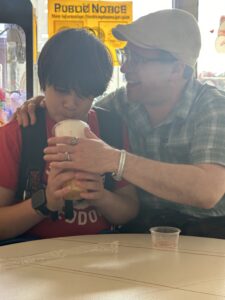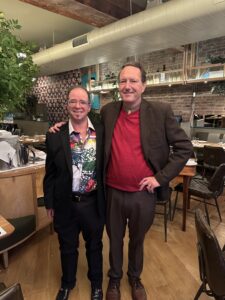
I finally feel cuter than my cat. Photo by Ezra Autumn Wilde; shirt by Robert Graham; body by Pioneer Valley Plastic Surgery.
2023 was another year of huge spiritual and material shifts. I am now a certified Priest of Witchcraft, having completed Year Two of the Temple of Witchcraft Mystery School in September. I manifested the three big things I’ve been working towards for years: top surgery, adopting my own cat, and a publisher for my second novel, Origin Story, which will be out from Saddle Road Press this summer. In case you missed it, my essay “Double Incision Diary” in Solstice Lit Mag describes how my witchcraft practice made my surgery a sacred experience.

Theodore “Big Pussy” Cavalieri DiMeow lives for snacks.
Our family visited Los Angeles, Cape Cod, Boston, and New York City this year. Shane has become the star pupil at Hilltown Sled Dogs, a camp where young people learn to train Alaskan Huskies. I wish they operated a junior high school! Shane’s other happy place is Home Depot. He is teaching me how to use a leaf blower and a power drill.


Adam and I celebrated our 25th wedding anniversary with tickets to Barns Courtney‘s rock concert at Irving Plaza in Manhattan. It was a Dionysian experience, with the energy of a pagan religious revival. We didn’t go in the mosh pit, though.


I did not publish many poems this year, but I wrote a lot of weird new ones about butts. There’s still time to sponsor me for 30 Poems in November. We raised over $75,000 for immigrant literacy and job-training programs at the Center for New Americans! I achieved my personal goals of raising $500, writing 30 poems, and avoiding my novel.
Some books that made an impact on me this year:
Psychoanalyst Avgi Saketopoulou’s provocative book Sexuality Beyond Consent: Risk, Race, Traumatophilia (New York University Press, 2023) restores mystery and risk to our encounters with one another through limit-pushing sex or controversial art. Saketopoulou proposes that we should not pathologize trauma survivors for seeking out states of “overwhelm”. Wounds have an erotic charge, and going towards this taboo experience can free up our energy for new ways of processing what cannot be cured. It’s liberating to acknowledge that there’s no undamaged state to get back to, because then we can move forward without so much fear of contamination–what she calls “traumatophobia,” or the goal of avoiding triggers at all costs. Therapists are not immune from pushing a patient toward a tidy but illusory closure because of their own discomfort with witnessing trauma.
In fiction, I’m currently enjoying The Best Mystery Stories of the Year: 2021, guest-edited by Lee Child. This series curated by Otto Penzler and The Mysterious Bookshop has been hit-or-miss for me, with some years’ entries stuffed with sad literary stories with a crime in them, rather than real whodunits. This edition will satisfy fans of old-school detection, and also has a good gender balance of protagonists and writers. If you’re feeling more literary, check out King of the Armadillos (Macmillan, 2023) by my fellow St. Ann’s School alum Wendy Chin-Tanner. Based on her father’s life story, this bittersweet novel follows a Chinese immigrant teen in the 1950s who’s sent to a leprosy hospital in Louisiana, and his father and brother left behind in Brooklyn, who must balance traditional family duties with the forbidden loves offered by the freedom and anonymity of America.
2023 was an encouraging year to be an old guy. Henry Kissinger died at 100, bringing joy to the world. Charles III was finally crowned at 75, with Camilla by his side. The guy paid his dues. But “The Crown” is still boring since Princess Di is gone.
“And now, at last, I shall be King of Engl–“